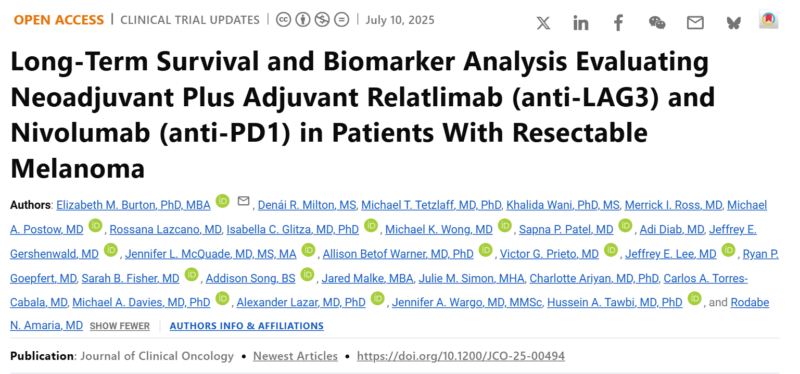Daniel Flora, Medical Director of Oncology Research at St. Elizabeth Healthcare, shared a post on LinkedIn about a paper by Elizabeth M. Burton et al. published in the Journal of Clinical Oncology:
“A Paradigm Shift in Cancer Care: Immunotherapy Before Surgery Delivers Long-Term Survival
This is one of the most important shifts I’ve seen in cancer care in recent years.
For decades, the model for cancer treatment was first surgery, then give chemotherapy, radiation, or immunotherapy afterward to reduce the risk of recurrence.
What we’re learning for some cancers, treating before surgery may actually be more effective. This is called neoadjuvant therapy, and it is quickly becoming a new standard in melanoma.
A new phase II study published in the Journal of Clinical Oncology followed patients with advanced (stage III/IV) resectable melanoma who were treated with a dual immunotherapy combination: nivolumab (anti-PD1) and relatlimab (anti-LAG-3). The treatment was given both before and after surgery.
The long-term results are impressive:
At four years, patients had an 87% overall survival rate
Among patients who had a major response, meaning the tumor was mostly or completely gone at surgery, patients had a 95% overall survival rate
To understand how far we’ve come, it helps to remember where we started.
Before immunotherapy, patients with advanced stage III melanoma faced a grim outlook. Five-year survival was often well below 50 percent, even with aggressive surgery and older systemic therapies like high-dose interferon, which carried significant side effects and limited benefit.
Neoadjuvant immunotherapy changes the equation. By treating the tumor while it is still present, we give the immune system a better target. We can assess whether the treatment is working and adjust if it is not. And we may even spare patients unnecessary toxicity down the road.
This trial adds to a growing list of studies, including NADINA and SWOG S1801, that show early immune engagement leads to stronger and more durable responses.
And it is not just melanoma. Neoadjuvant approaches are gaining traction in breast, lung, rectal, and bladder cancer too. In some cases, patients who respond completely may be able to avoid surgery altogether.
This is not just a shift in timing. It is a shift in philosophy. For many patients, that may mean better outcomes, fewer side effects, and more hope.
In my practice, I have shifted to a neoadjuvant approach for advanced melanoma and breast cancers and am seeing similar results.”
Title: Long-Term Survival and Biomarker Analysis Evaluating Neoadjuvant Plus Adjuvant Relatlimab (anti-LAG3) and Nivolumab (anti-PD1) in Patients With Resectable Melanoma
Authors: Elizabeth M. Burton, Denái R. Milton, Michael T. Tetzlaff, Khalida Wani, Merrick I. Ross, Michael A. Postow, Rossana Lazcano, Isabella C. Glitza, Michael K. Wong, Sapna P. Patel, Adi Diab, Jeffrey E. Gershenwald, Jennifer L. McQuade, Allison Betof Warner, Victor G. Prieto, Jeffrey E. Lee, Ryan P. Goepfert, Sarah B. Fisher, Addison Song, Jared Malke, Julie M. Simon, Charlotte Ariyan, Carlos A. Torres-Cabala, Michael A. Davies, Alexander Lazar, Jennifer A. Wargo, Hussein A. Tawbi, Rodabe N. Amaria.
You can read the Full Article in the Journal of Clinical Oncology.

More posts featuring Daniel Flora.


